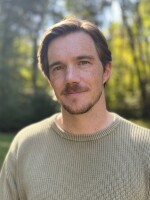Asheville has been home to an African-American community for centuries. However, African-American residents in Asheville and western North Carolina have historically suffered from systemic inequality and racial disparities.
In the new radio program and podcast “The Waters and Harvey Show,” co-hosts Darin Waters and Marcus Harvey examine western North Carolina’s cultural history and the narratives of marginalized communities.
Host Frank Stasio previews the show with Darin Waters, professor of history at the University of North Carolina-Asheville, and Marcus Harvey, religious studies professor at UNC-Asheville.
INTERVIEW HIGHLIGHTS:
Waters on the history of African-Americans in Asheville and his upbringing in the region
My family dates back to the 1850s, and it became frustrating when I was asked where I was from to have people say, “Are there really African-Americans in that region of the state?” We’re not only talking about western North Carolina but all of southern Appalachia as well. There are movements that have started, one is called the Affrilachian Artist Project. This is an effort to begin to uncover what the unique experiences of Appalachian African-Americans has been.
Waters on the legacy of the Young Men’s Institute (YMI) for the African-American community in Asheville
I was very proud to discover that the idea for the creation of the YMI really originated within the African-American community. I had grown up hearing that George Vanderbilt had initially built it for the African-American workers on his estate, which essentially puts the onus for the creation of the institute on his side. But Vanderbilt and his attorney made very clear in the records that exist at the Biltmore Estate that the idea was not originally his. It originated and was indigenous to the African-American community which gives agency to that community. That’s something that is important for the history of African-Americans in this space, especially in a place where people have assumed there was no African-American population.
Harvey on how he and Waters incorporate concepts of collective memory and national history in conversations about marginalized communities
What became very clear over the course of our conversations is that memory history are particularly pertinent within the African-American community, because this is a community whose history not only tends to be marginalized and submerged within the dominant national narrative, but African-Americans are oftentimes invited to remember their own histories that are very reductionistic, very narrow. Oftentimes when I am having conversations with other African-Americans locally and nationally about African-American history, they will go straight to the civil rights movement of the ‘50s and ‘60s as if there is not much substantial history to speak of prior to the 1950s and ‘60s. It’s really important on our new show to help listeners understand what differentiates memory and history.
Waters on the legacy of Asheville photographer Isaiah Rice, who was also Waters’ grandfather
We discovered he wasn’t just taking family photographs, he was taking photos throughout the entire city and region. He amassed, over the period of the late 1940s up through the 1980s when he passed away, a collection of 1,600 photographs that give you a documentary history of the African-American community in Asheville and across western North Carolina through that period. This photo collection now housed at UNC-Asheville is giving us a significant look at the African-American experience from the perspective of African-Americans.
Harvey on the his experience at the Asheville Goombay Festival and how the area’s cultural scene incorporates diversity within the region
It’s marketed as an African and Caribbean festival but having attended the festival for the past several years, what became apparent to me was that it wasn’t really clear how specific regions of Africa or specific regions of the Afro-Caribbean world were being invoked during this festival. It also wasn’t clear to me the connection that was being made between Africa, the Afro-Caribbean world and the very specific African-American or Affrilachian experience in this region. That was very troubling to me.
“The Waters and Harvey Show” airs Saturdays at 3 p.m. on Blue Ridge Public Radio News.









